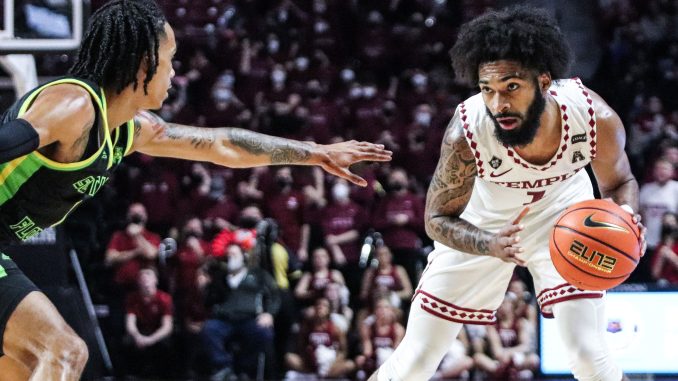
With postponements and many injuries, head coach Aaron McKie had to make adjustments on the fly this season.
“What I was trying to explain to these guys, nobody cares if you have injuries or if you have a few guys sit out because of COVID,” McKie said. “You have to continue to play games, you have to continue at a high level and that’s life.”
The Owls had three of their starters go down with injuries this season, resulting in a next-man-up mentality. While McKie already had a young team, he relied on the bench to fill those holes. However, lack of game exposure made it difficult for this roster to finish games down the stretch.
After clinching the No. 4 seed and a first-round bye, Temple University men’s basketball fell 69-60 to Tulane University (14-15,10-8 The American Athletic Conference) in The American quarterfinals on March 11, finishing out the season with a 17-12 record overall and 10-7 in The American.
Temple was ranked 357 of 358 NCAA Division I teams in terms of game experience. By the end of the season, Temple’s starting five consisted of freshman forward Nick Jourdain, freshmen guards Hysier Miller and Jahlil White, redshirt-sophomore guard Tai Strickland and redshirt-freshman guard Damian Dunn.
Dunn and Strickland are the only players with more than two seasons of game experience under their belts.
“We certainly knew we had some flaws, but we managed to get this far with it,” McKie said on making it to the quarterfinals. “I wanted to go further, but it didn’t happen. Through it all, I’m still proud of these guys.”
When sophomore guard Khalif Battle, who averaged 21.4 points per game, was ruled out for the season with a fractured metatarsal McKie turned to a scoring committee to fill the scoring gap.
McKie leaned on a deep rotation that was able to score by committee. Freshman guard Quincy Ademokoya got his first start in place of Battle. Hicks and Miller, who both averaged more than 18 minutes a game, also saw more minutes off the bench. But it was Temple’s backcourt with Dunn and Williams that gave this team some consistency.
Williams, the primary ball handler, would try to find open looks on offense, where he would usually look to Dunn, a solid shooter. In a 71-63 defeat against East Carolina on Feb. 2, Dunn led with 26 points, shooting 3-of-5 from three — two of those 3-pointers were assisted by Williams.
Jourdain also became another scoring option for Temple. When the Owls played at the University of Tulsa (11-20, 4-14 The American) on Jan. 12, Jourdain scored 23 points on 52.9 percent shooting from the field in a 69-64 win.
A large part of Temple’s game midway through the season was its defense. In The American, Temple finished second in three-point field goal percentage defense, meaning they could push teams to take shots from the perimeter, but not allow them to fall.
“We take defense personal,” Dunn said. “It’s a part of our culture and that’s just something that we really take pride in.”
However, Temple still had flaws throughout the entire season. The Owls finished second to last in scoring offense and three point percentage.
As a team, Temple shot 40.3 percent from the field and 31.1 percent from three. They exposed their inability to make shots when Williams (shoulder) and Dunn (ankle) went down with injuries in a 52-49 loss to South Florida on Feb. 7.
Temple relied on Hicks and Miller to fill Dunn and Williams’ roles, while adjusting to half-court sets to accommodate the versatility of players like Jourdain.
While Jourdain saw more minutes, he was one of many players who fell into foul trouble late in games, forcing McKie to use a deeper bench. Fouling was an issue for the Owls all season, but down the stretch it became a bigger problem during higher-stakes games.
In big losses to the University of Memphis (21-9, 13-5 The American) on Feb. 24, and the University of Houston (28-5, 15-3 The American) on March 3, Jourdain fouled out of both games, while redshirt-sophomore forward Arashma Parks fouled out against the Tigers. This gave more minutes to guys like freshman forward Emmanuel Okpomo, but limited the team’s versatility overall.
And even when all forwards were available for Temple, it was their lack of presence down low leading to games getting out of hand.
McKie preached establishing a presence in the paint before each game, but rarely could rely on this brand of basketball when shots were not falling. This was clear in The AAC Tournament loss when Tulane pulled away because of its superior defensive presence down low.
Next season the Owls will not only return the majority of their players but will be able to develop the young talent as well. They should have a healthy lineup with Battle, Dunn and Williams in the mix, but McKie can also look to his deep bench for players who already have a year of experience under their belt.
“Everyone on our team can step it up,” Williams said. “We all had to adapt this season.”


Be the first to comment